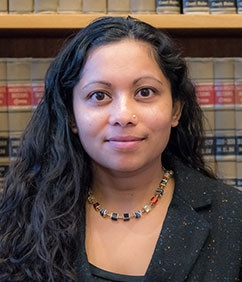Radha Natarajan ’03 revitalizes the New England Innocence Project
Before she had even graduated from college, Radha Natarajan ’03 helped prepare an oral argument for the US Supreme Court. Among the cases she worked on as a legal assistant for voting rights attorney Joaquin Avila was Lopez v. Monterey County: Avila, representing Hispanic voters in Monterey County, California, made a successful Supreme Court argument that under the Voting Rights Act the county had to obtain pre-clearance for changes in its judicial election system. “[Avila] was my first mentor,” Natarajan says, “and that formative experience is why I went to law school.”
Natarajan currently serves as executive director of the New England Innocence Project (NEIP), an organization that provides legal representation to people who have claims of wrongful conviction in six New England states. She arrived at NYU Law planning to follow in Avila’s footsteps into a career in voting rights, but she says that reviewing habeas petitions as a judicial intern with US district judge Harold Baer in the Southern District of New York during her 1L summer brought her attention to injustices in the criminal justice system—and in particular, to wrongful convictions on the basis of eyewitness identification.
“I was looking at eyewitness identification cases where it was clear that [the defendant] didn’t meet the description, or where it was clear to me that there were other avenues that the defense attorney could have pursued,” Natarajan says. “And I realized that if you lose your freedom, nothing can compare to that level of injustice.”
As her interests turned toward criminal law and public defense, Natarajan says, she felt lucky to be able to take courses with NYU Law faculty members such as Judge Harry Edwards of the US Court of Appeals for the DC Circuit and Professors Randy Hertz, Bryan Stevenson, and Kim Taylor-Thompson. “You can talk about laws as something on a piece of paper or you can talk about the ways laws impact people,” says Natarajan. “With Kim Taylor Thompson, of course you learn about the different models of criminal law and all of those things that everybody learns about—but you also learn about the impact on humanity, and you talk and think about and struggle over that.”
Natarajan developed her student note on the topic of eyewitness identification into a paper that was ultimately published in the NYU Law Review. Her article, “Racialized Memory and Reliability: Due Process Applied to Cross-Racial Eyewitness Identification,” suggested a new admissibility test for eyewitness identification evidence that would take into account scientific studies that people are less likely to correctly identify members of another race. She continued to pursue the issue after law school in her work as a public defender with the Committee for Public Counsel Services in Roxbury, Massachusetts.
In 2011, she served on Massachusetts’ Supreme Judicial Court Study Group on Eyewitness Evidence, whose recommendations on how to incorporate modern scientific research on eyewitness identifications into evidence procedures were released in 2013 and adopted by the court. “What’s so important is that Massachusetts now can be a template for other jurisdictions,” Natarajan says. “Every legal system relies on eyewitness identification, so you know that there are wrongful convictions resulting from these. And so, by being faithful to the science, we can reduce that.”
Judge David Weingarten of the Boston Municipal Court first met Natarajan more than a decade ago when they were both public defenders. “She was a wonderful criminal defense lawyer, very steeped in criminal procedure, evidence, the law of the case, and very granular in her understanding of the facts and what mattered in a particular case,” Weingarten says. In the time that he has known her, he says, “she has become one of the foremost experts in the area of identification and the law, and the various kinds of identification issues that arise in criminal cases.”
After 12 years as a public defender, Natarajan joined the NEIP as a staff attorney in 2015. Two years later, the NEIP was struggling financially and faced possible closure. Natarajan joined with a group of volunteers, including both employees and supporters, and together they raised the money to keep the doors open. In January 2018, Natarajan took over as executive director.
Her first priority was to rebuild the organization, raising enough new sources of funding to stay operational. She then was able to hire new staff members, including a communications director and a new staff attorney—another NYU Law alumna, Laura Carey ’10. “The NEIP was really in a very difficult spot, and its future was very uncertain, and she took that crisis as an opportunity to motivate people to get behind the organization,” says Karen Newirth ’02, a senior staff attorney with the Innocence Project’s strategic litigation unit. “I think she should be credited with saving the organization.”
The newly revitalized NEIP has marked several policy wins over the past year. Under Natarajan’s leadership, the NEIP was instrumental in lobbying for Massachusetts’s creation of a forensic science oversight board, and the organization will have a seat on the board when it convenes this year. The NEIP also successfully advocated, with others, for the passage of a bill doubling the compensation for exonerees in Massachusetts.
As she looks to the future, Natarajan hopes to build on these successes. “We have a six-state region, and we’ve done some incredible work in Massachusetts and some of the other states, but we really want to have a greater presence throughout New England,” she says.
But even as she makes these strategic moves for the organization, Natarajan never loses sight of the mission at the core: helping individuals in the system receive justice. “I have a client who has been in prison for 35 years now,” she says. “And so he’s always someone who is on my mind. And we’re working to gain his freedom as soon as we can.”
Posted January 24, 2019


